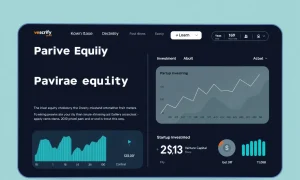Robinhood has just announced a groundbreaking move that could democratize startup investing forever. The trading platform filed with the SEC to launch the Robinhood Ventures Fund I, potentially giving everyday investors access to pre-IPO startup opportunities previously reserved for venture capitalists and wealthy accredited investors.
What the Robinhood Ventures Fund Offers
The proposed Robinhood Ventures Fund represents a closed-end mutual fund structure that will hold shares in private startups. This approach differs significantly from Robinhood’s previous controversial tokenized stock offering in the EU. Instead, the new fund follows traditional investment vehicle guidelines while targeting innovative sectors.
Investment Focus and Target Industries
According to SEC filings, the Robinhood Ventures Fund expects to invest across several high-growth sectors. The fund specifically targets aerospace and defense, artificial intelligence, fintech, robotics, and enterprise software companies. However, Robinhood has not yet disclosed specific startup holdings or investment allocations.
Addressing the Retail Investor Gap
Currently, retail investors face significant barriers to startup investing. Accredited investors—those meeting specific wealth requirements—can access venture capital firms like OurCrowd. Meanwhile, non-accredited investors have limited options despite wanting exposure to pre-IPO growth opportunities.
The Robinhood Ventures Fund aims to bridge this accessibility gap. Similar funds already exist, such as Cathy Wood’s ARK Venture Fund, which holds stakes in companies like Anthropic and SpaceX. However, Robinhood’s massive retail user base could make this offering particularly impactful.
Previous Controversies and New Approach
Robinhood’s last attempt at private market access drew criticism. Earlier this year, the company launched tokenized stocks in the EU that claimed to offer exposure to private companies like OpenAI. However, OpenAI clarified that these tokens didn’t represent actual equity ownership.
The new Robinhood Ventures Fund takes a more conventional approach. As a registered mutual fund, it must comply with strict SEC regulations regarding disclosure, fees, and operations. This structure provides greater transparency and investor protection compared to previous offerings.
Unanswered Questions and Timeline
Several crucial details remain unknown about the Robinhood Ventures Fund. The company hasn’t disclosed management fees, share quantities, or minimum investment requirements. Additionally, the specific startup portfolio and launch timeline remain uncertain.
Robinhood currently maintains a quiet period regarding the fund and declined to comment further. The SEC review process typically takes several months, meaning retail investors might need to wait before accessing this new investment vehicle.
Potential Market Impact
The Robinhood Ventures Fund could significantly impact both retail investing and startup funding ecosystems. If successful, it may pressure other platforms to offer similar products. Furthermore, it could provide startups with additional capital sources beyond traditional venture funding.
However, investors should recognize that startup investing carries substantial risks. Private companies often experience higher failure rates than public companies, and liquidity constraints may limit exit opportunities.
Frequently Asked Questions
What is the Robinhood Ventures Fund?
The Robinhood Ventures Fund is a proposed closed-end mutual fund that will invest in private startup companies, allowing retail investors to access pre-IPO investment opportunities.
When will the fund be available to investors?
Robinhood has not announced a specific launch date. The fund must first complete the SEC review and approval process, which typically takes several months.
What types of companies will the fund invest in?
The fund expects to focus on aerospace and defense, artificial intelligence, fintech, robotics, and enterprise software companies, though specific holdings haven’t been disclosed.
How does this differ from Robinhood’s previous tokenized stocks?
Unlike the tokenized stocks that tracked prices without actual equity ownership, this fund will hold real shares in private companies through a regulated mutual fund structure.
What are the risks of investing in startup funds?
Startup investments carry higher risks including potential loss of capital, illiquidity, and company failure. Investors should carefully consider their risk tolerance before investing.
Will there be management fees for this fund?
Robinhood has not yet disclosed fee structure details. Typically, mutual funds charge management fees that cover operational costs and fund management services.








